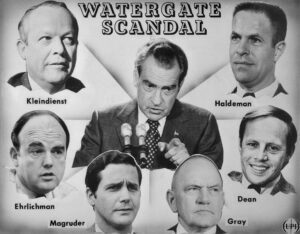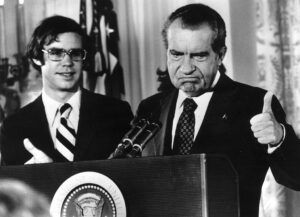Watergate: Eroding Public Trust in the System
Watergate was so influential all government scandals now end in gate.
By: Andrew Moran | April 20, 2021 | 798 Words

The Watergate complex, as seen from the Kennedy Center. This was the site of the illegal activities that led to the historical impeachment and resignation of U.S. President Richard Nixon. (Getty Images)
From Beachgate to Russiagate, every government scandal now ends with a “gate” suffix. This comes from the historic 20th-century Watergate scandal that took down President Richard Nixon and forever altered the state of U.S. politics and America’s perception of its elected leaders. What was Watergate, and why is it still relevant a half-century later?
Watergate: A Primer
In June 1972, five men were arrested after breaking into the Democratic National Committee (DNC) headquarters at the Watergate complex in the nation’s capital. They were allegedly there to steal copies of top-secret documents and bug office phones. It was initially considered to be an ordinary burglary, but the crime quickly transformed into the worst political scandal of the 20th century and the beginning of the end of the Nixon presidency.

(Getty Images)
The Fallout of Watergate
In October 1972, reporters Carl Bernstein and Bob Woodward published a story that stated the FBI believed that aides to President Richard Nixon were responsible for the burglary. The White House denied any involvement in the incident. Apparently, the people believed it, as Nixon won re-election in a landslide with 520 electoral college votes and 60.7% of the popular vote. In the following months, however, heavyweights within the Nixon White House resigned, including Chief of Staff H.R. Haldeman, Attorney General Richard Kleindienst, and White House counsel John Dean. Also, seven men were indicted by a grand jury for their involvement in wiretapping and stealing DNC documents – they were later found guilty or pleaded guilty:
- Bernard Baker: Watergate burglar.
- Virgilio Gonzalez: Watergate burglar.
- Howard Hunt: Former CIA agent and organizer of the Watergate break-in.
- Gordon Libby: Former FBI agent and organizer of the Watergate break-in.
- Eugenio Martinez: Watergate burglar.
- James McCord: Former CIA agent and Watergate burglar.
- Frank Sturgis: Watergate burglar.
The Senate Watergate Committee, also known as the Senate Select Committee on Presidential Campaign Activities, held hearings into the Watergate incident in May 1973, which were televised across the country. It was chaired by Sen. Sam Ervin (D-NC), Sen. Howard Baker (R-TN) was the GOP ranking member, and Archibald Cox was appointed special prosecutor.
Dean became a star witness, testifying about the White House and Nixon’s involvement in the Watergate break-in and then the cover-up. Former White House aide Alexander Butterfield revealed that the president had maintained secret records of all his White House conversations since 1971. These recordings were requested by the committee, prompting two subpoenas, which Nixon had formally turned down. A judge had ordered the president to turn them over to the committee, but he appealed all subpoenas.
In July 1974, the Supreme Court of the United States unanimously ruled against President Nixon’s “absolute, unqualified Presidential privilege of immunity from judicial process under all circumstances.” This forced Nixon to immediately hand over the original recordings of more than five-dozen conversations. In that same month, the House Judiciary Committee approved three articles of impeachment against Nixon. The tapes were transferred to Leon Jaworski, a special prosecutor.
With the walls closing in on his administration, Nixon announced his resignation on Aug. 8, 1974:
“I have never been a quitter. To leave office before my term is completed is abhorrent to every instinct in my body. But as president, I must put the interest of America first. America needs a full-time president and a full-time Congress, particularly at this time with problems we face at home and abroad. To continue to fight through the months ahead for my personal vindication would almost totally absorb the time and attention of both the president and the Congress in a period when our entire focus should be on the great issues of peace abroad and prosperity without inflation at home. Therefore, I shall resign the presidency effective at noon tomorrow.”

Richard Nixon gives the thumbs up after his resignation as 37th President of the United States. (Photo by Gene Forte/Consolidated News Pictures/Getty Images)
A day later, Nixon signed his resignation, allowing Vice President Gerald Ford to become president. A month later, Ford pardoned Nixon.
Woodward and Bernstein received most of their information from an anonymous whistleblower. In 2005, it was revealed that W. Mark Felt, a former associate director of the FBI, was the source.
What Did Watergate Tell Us About Politics?
The history of the United States is complete with honorable statesmen who constructed the almost mythical innocence of the nation’s political system. Be it President George Washington’s “I cannot tell a lie” or President Abraham Lincoln’s “Honest Abe” nickname, the world’s greatest experiment had often been viewed as a pristine foundation with a focus on “life, liberty, and the pursuit of happiness.” But this perception of the political landscape has vanished over the years, and the Watergate scandal erased the last of it.
















